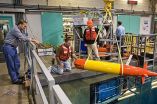(Press-News.org) Every person emits the equivalent of approximately two tonnes of carbon dioxide a year from the time food is produced to when the human body excretes it, representing more than 20% of total yearly emissions. That is what a study by the Universidad de Almería says, confirming for the first time that human excrements contribute to water pollution, primarily with nitrogen and phosphorus.
A team of researchers from the Universidad de Almería (UAL) has estimated the environmental impact of the Spanish diet and role that human excrements play in the life cycle of food. It is the first time that a scientific study of this type incorporates the role played by human excrements.
"Food in Spain produces emissions of around two tonnes of carbon dioxide per person and per year (more than 20% of total emissions per person and per year) and consumes 20 gigajoules of primary energy," main author of the study and researcher at the UAL Iván Muñoz told SINC.
The study, which was published recently in The International Journal of Life Cycle Assessment, analyses the relationship of the food production and consumption chain with global warming and the acidification and eutrophication (excess of nutrients) of the environment, taking what a person in Spain ate in 2005 (881 kilograms) as a reference.
Calculations included agricultural and animal production, industrial food processing, sale and distribution, preparation and cooking at home, solid waste treatment (food remains and packaging), as well as human excretion.
According to the study, producing food from animals, such as meat and dairy products, causes the greatest impact. Agriculture, livestock, fishing and the food industry are the greatest source of carbon dioxide water pollution, but in both cases the effects of human excretion (through breathing or due to waste water treatment) are next on the list.
Human Excretion Contributes Nutrients
"Human excretion contributes significantly to water polluting through providing organic matter and nutrients, such as nitrogen and phosphorus, which fosters the growth of algae, a decrease in the level of oxygen dissolved in the water, bad smells and other problems associated to eutrophication," Muñoz says, "although such effects are minimised by the purification processes performed before wastewaters are discharged into rivers or to the coast."
The researcher makes the point that returning these wastewaters to the environment is not a bad thing in itself, as they are nutrients, just like manure is reused as fertiliser in agriculture.
"The problem is that in many cases our rivers have a very low water level and find it difficult to soak up wastewaters, not only from excrements, but also from other sources such as pesticides and fertilisers used in farming and pollutants from industry," Muñoz indicates.
The researchers have also estimated the CO2 and methane produced by the human metabolism and the energy consumption associated to aspects such as using toilet paper, soap and basin water, together with the treatment of sewage at treatment stations.
As regards emissions, "human excrements have a net null effect on global warming, as they are offset by carbon fixation in photosynthesis. As a result, they do not contribute to increasing the concentration of CO2 in the atmosphere".
INFORMATION:
References:
Ivan Muñoz, Llorenç Milà i Canals y Amadeo R. Fernández-Alba. "Life cycle assessment of the average Spanish diet including human excretion". The International Journal of Life Cycle Assessment 15(8): 794-805, 2010. DOI: 10.1007/s11367-010-0188-z
Every person emits 2 tons of CO2 a year through eating
2010-11-03
ELSE PRESS RELEASES FROM THIS DATE:
Algae for biofuels: Moving from promise to reality, but how fast?
2010-11-03
A new report from the Energy Biosciences Institute (EBI) in Berkeley projects that development of cost-competitive algae biofuel production will require much more long-term research, development and demonstration. In the meantime, several non-fuel applications of algae could serve to advance the nascent industry.
"Even with relatively favorable and forward-looking process assumptions (from cultivation to harvesting to processing), algae oil production with microalgae cultures will be expensive and, at least in the near-to-mid-term, will require additional income streams ...
Exposure of humans to cosmetic UV filters is widespread
2010-11-03
Amsterdam, 2 November, 2010 - An investigation conducted in the context of the Swiss National Research Programme (NRP50), Endocrine Disrupters: Relevance to Humans, Animals and Ecosystems, demonstrates for the first time that internal exposure of humans to cosmetic UV filters is widespread.
In the course of the Summer and Fall 2004, 2005 and 2006 (3 cohorts), human milk was sampled by mothers who had given birth at the University Women's Hospital in Basel. The participants filled out a detailed questionnaire with general questions and, as special feature, in depth questions ...
New long-range undersea robot goes the distance
2010-11-03
Over the past decade, the undersea robots known as autonomous underwater vehicles (AUVs) have become increasingly important in oceanographic research. Today's AUVs fall into two groups: 1) propeller-driven vehicles that can travel fast and carry lots of instruments, but are limited to expeditions of only a few days; and 2) "gliders," which can stay at sea for weeks or even months at a time, but cannot travel very quickly. MBARI engineers recently demonstrated a new super-efficient AUV that combines the best of these two approaches. This new long-range AUV (LRAUV) can travel ...
Mayo Clinic Proceedings: November highlights
2010-11-03
The November issue of Mayo Clinic Proceedings includes three articles with leading research, highlighted below.
Khat Chewing Increases Risk of Stroke and Death in Patients With Acute Coronary Syndrome
ROCHESTER, Minn. -- Researchers found that people who chew khat and present with acute coronary syndrome had significantly higher rates of death, cardiogenic stroke, and stroke complications, despite having lower cardiovascular risk profiles.
"The leaves of khat, a leafy green shrub, are chewed habitually for euphoric and stimulating effects. The main ingredients, ...
First peer-reviewed study finds BPA levels in US foods 1,000 times less than limits
2010-11-03
Note to journalists: Please credit the journal or the American Chemical Society as publisher of this report.
WASHINGTON, Nov. 2, 2010 — For the first time in the United States, researchers are reporting in a peer-reviewed scientific journal today detection of Bisphenol A (BPA) in fresh and canned food as well as food wrapped in plastic packaging. The amounts in the limited sample, however, were almost 1,000 times lower than the "tolerable daily intake" levels set by the U.S. Environmental Protection Agency (EPA) and the European Food Safety Authority (EFSA). Their report ...
Mouse model confirms mutated protein's role in dementia
2010-11-03
A team of scientists from Japan and the University of California, San Diego School of Medicine have created a new mouse model that confirms that mutations of a protein called beta-synuclein promote neurodegeneration. The discovery creates a potential new target for developing treatments of diseases like Parkinson's and Alzheimer's.
The work is published in today's issue of Nature Communications. Lead author is Makoto Hashimoto of the Division of Chemistry and Metabolism, Tokyo Metropolitan Institute for Neuroscience, with colleagues including Eliezer Masliah, MD, professor ...
New research from Psychological Science
2010-11-03
A Spontaneous Self-Reference Effect in Memory: Why Some Birthdays Are Harder to Remember Than Others (http://pss.sagepub.com/content/21/10/1525.abstract)
Selin Kesebir and Shigehiro Oishi
People may have a better memory for birthdays that are closer to their own: Volunteers recalling their friends' birthdays tended to remember birthdays that were closer to their own than birthdays that were farther away from their own birthday. In a separate experiment, after reading brief biographies of people they did not know, volunteers correctly remembered the birthdays of the ...
Geriatrician advocates for improvements to primary care to meet the needs of older adults
2010-11-03
In an article published in November 3 edition of Journal of the American Medical Association (JAMA), Chad Boult, MD, MPH, MBA, professor of Health Policy and Management at the Johns Hopkins Bloomberg School of Public Health, calls for key improvements to primary care in order to improve the health of the nation's most costly patients—older adults with multiple chronic conditions. Boult and his co-author, G. Darryl Wieland, PhD, MPH, research director of Geriatrics Services at Palmetto Health Richland Hospital, Columbia, South Carolina, evaluated studies of new primary care ...
UMass Medical School study points to genetic link in apnea of prematurity
2010-11-03
WORCESTER, Mass. – A potentially life-threatening challenge characterized by pauses in breathing that can last for more than 20 seconds, apnea of prematurity (AOP) affects more than 50 percent of premature infants and is almost universal in the smallest of preemies. Caused in part by an underdeveloped central nervous system that can't adequately regulate breathing outside of the womb, especially during sleep, AOP is not yet fully understood by scientists and remains a grave concern among neonatologists and parents alike. New research published in the October issue of Pediatrics ...
Unique duality: Princeton-led team discovers 'exotic' superconductor with metallic surface
2010-11-03
A new material with a split personality -- part superconductor, part metal -- has been observed by a Princeton University-led research team. The discovery may have implications for the development of next-generation electronics that could transform the way information is stored and processed.
The new material -- a crystal called a topological superconductor -- has two electronic identities at once. At very low temperatures, the interior of the crystal behaves like a normal superconductor, able to conduct electricity with zero resistance. At the same time, the surface ...



